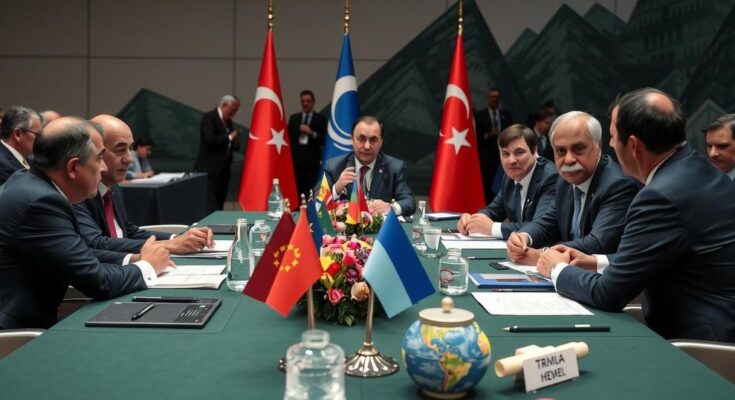At COP29 in Baku, diverse stakeholders emphasized the role of storytelling in climate action. Engaged in conversations about the influence of narratives on climate perception, participants discussed the urgent need for radical collaboration across sectors. Students from the Columbia Climate School are focusing on projects that integrate climate science and storytelling, aiming to inspire communities and influence public opinion regarding climate change.
As a participant at the UN climate change conference COP29 held in Baku, Azerbaijan, I witnessed first-hand the significant dialogues surrounding climate action, including the crucial role of storytelling in shaping public perception and behavior related to climate change. Over the course of two weeks, leaders and experts from over 200 nations convened, emphasizing the synergy between storytelling and climate action, particularly through the influence of educational initiatives. My position as a member of the steering committee for the UNFCCC Entertainment & Culture for Climate Action Film & TV (ECCA) allowed me to engage in critical discussions on finance, human migration, and the cultural approaches necessary to address climate solutions.
I represent a diverse group of students at the Climate School, where we explore geopolitical climate themes through innovative storytelling across various mediums. As we analyze pressing climate issues, my students express profound concern over the impacts of climate change they witness in their home countries, ranging from rising sea levels to catastrophic flooding. The emotional resonance of these stories is paramount; research underscores that narratives can galvanize public engagement in ways traditional media cannot.
During COP29, the discussions around climate mobility and forced displacement were particularly poignant, resonating with themes highlighted in my students’ coursework. My interactions with experts during “Knowledge Day” further illuminated the necessity for community leaders to translate scientific data into actionable local strategies. Literature, such as Amitav Ghosh’s “The Great Derangement,” challenges us to rethink the political framing of climate change within different cultures, emphasizing the need for an urgent response.
The media landscape, particularly in film industries, often remains silent on urgent climate issues due to fears of political backlash or diminished profits. At COP29, I emphasized the importance of integrating climate narratives into mainstream storytelling while acknowledging the challenges posed by fossil fuel lobbying. My colleagues from the Global South passionately advocated for a more substantial global financing framework to assist vulnerable nations impacted by climate change, leading to intense negotiations that underscored the stark discrepancies in global priorities.
Engaging with influential leaders and community advocates at COP29, I recognized that fostering transformative storytelling is not merely an artistic endeavor; it is critical for generating widespread awareness and empathy. My students’ ongoing projects mirror this sentiment as they seek to create compelling narratives that engage diverse audiences and trigger dialogue around climate-related themes. We must recognize that a multidisciplinary approach to climate action is essential to nurture collective responsibility and inspire innovative solutions across sectors.
In conclusion, the discussions at COP29 accentuate the urgent need for radical collaboration across all societal segments, fostering a shared commitment to addressing climate change through storytelling and empathy-based practices. Investing in narrative-driven initiatives can catalyze meaningful change, underscoring our shared humanity and the collective responsibility we bear for continuity and sustainability in a warming world.
The United Nations Climate Change Conference (COP29) presents a global platform for discussing strategies and solutions related to climate change, engaging stakeholders from multiple sectors including government, civil society, and academia. This year’s conference took place in Baku, Azerbaijan, amidst the backdrop of geopolitical tensions and economic disparities. The role of storytelling within the climate dialogue has gained traction, with advocates from the cultural sectors emphasizing its potential to shape public discourse and inspire action. Education initiatives, such as those at the Columbia Climate School, aim to equip students with the skills to craft compelling narratives that resonate with the broader public on climate issues. Understanding the emotional and rational components of storytelling is critical in addressing the complexities of climate change.
The reflections from COP29 highlight the paramount importance of storytelling in the collective endeavor to tackle climate change. By bridging diverse voices and empowering communities through creative narratives, we can foster a sense of connection and responsibility. The emphasis on radical collaboration underscores that collaborative efforts across various disciplines are crucial for enabling profound and lasting societal shifts in how we perceive and address the climate crisis. Our collective storytelling can catalyze not only awareness but also actionable change in pursuit of a sustainable future for the next generations.
Original Source: news.climate.columbia.edu




